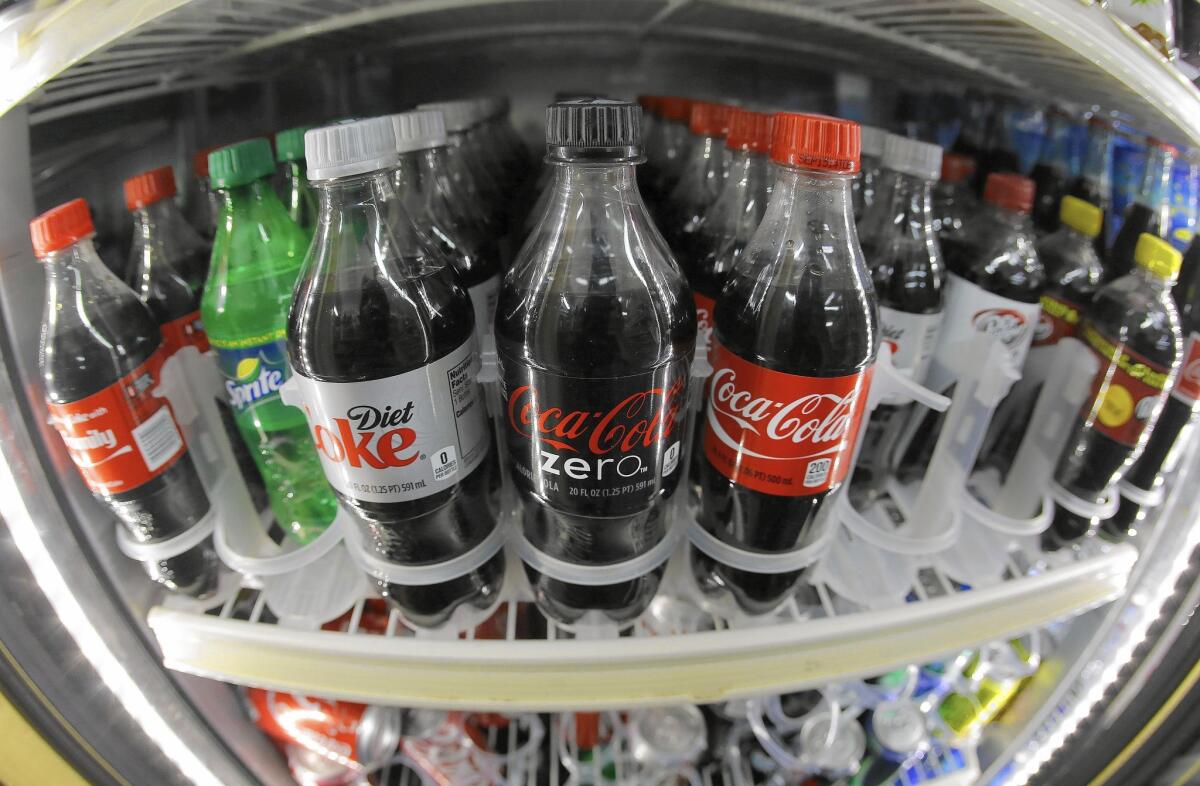Tax on sugary drinks approved in Berkeley; S.F. measure falls short

- Share via
In voting Tuesday, Berkeley voters became the first electorate in the nation to approve a tax on sodas and other sugary beverages, while a similar measure in San Francisco fell short.
The Berkeley measure levies a penny per ounce for sugar-sweetened beverages sold in the city, including sodas, sports and energy drinks, juices with added sugar, and syrups that go into sugary drinks at cafes, such as Starbucks’ Frappuccinos, the measure’s backers say. Diet sodas and alcohol won’t be taxed under the law. About 75% of Berkeley voters backed Measure D.
The measure was backed by public health advocates and the city’s elected leaders, who said the tax would reduce consumption of sugary drinks and raise awareness of the link between sugary drinks and diabetes and other diseases. The measure’s backers say a national soda tax in Mexico has caused people there to consume fewer sugary drinks.
The American Beverage Assn. spent $2.4 million to defeat Measure D, and an additional $9.1 million to fight San Francisco’s Proposition E, which would have imposed a 2-cent-an-ounce tax on sodas and other sugar-sweetened drinks.
Though 54.5% of San Francisco voters backed the sugary-drink tax, a tally of 66.67% was needed to pass the measure. The two-thirds threshold was required because the tax revenue would have gone to a special fund for recreation and nutrition programs in schools and parks. The Berkeley measure needed only a majority to pass because that revenue went into the city’s general fund.
“We’re saying no to Big Soda,” Berkeley Mayor Tom Bates said, according to the Associated Press. “We’re saying that Berkeley and the rest of the country need to pay attention that soda is such a destructive product.”
A spokesman for the beverage association praised the San Francisco election results as a win for personal choice, and said Berkeley’s election results were not the beginning of a new trend. “Berkeley is very eclectic. It doesn’t look like Anytown USA,” spokesman Roger Salazar said, according to the AP.
In San Francisco, three supervisors who supported the measure took solace that most voters backed the tax. “With Berkeley’s results, and our numbers, we have delivered a double black eye to the beverage industry. ... We are excited for our allies in Berkeley, who knocked over the first domino tonight, beginning a nationwide public health movement,” supervisors Scott Wiener, Eric Mar and Malia Cohen said in a statement.
Voters in two California suburbs rejected taxes on sugary beverages in 2012, with measures in El Monte and Richmond failing by more than a two-thirds vote. Measures targeting sugary beverages have also failed in the Legislature, including one requiring warning labels on sodas stating that sugar contributes to obesity, diabetes and tooth decay. In New York, a high-profile effort by then-Mayor Michael Bloomberg to restrict the sale of super-sized sugary beverages failed.
The Berkeley measure levies the tax on the 15 to 20 companies that contract with beverage makers to distribute their products in the city, and would be charged as part of their business license fee, backers of the measure say. The tax would not be collected from retailers or from consumers at the cash register.
Staff writer Amanda Covarrubias contributed to this report.
Follow me on Twitter: @ronlin
More to Read
Sign up for Essential California
The most important California stories and recommendations in your inbox every morning.
You may occasionally receive promotional content from the Los Angeles Times.











